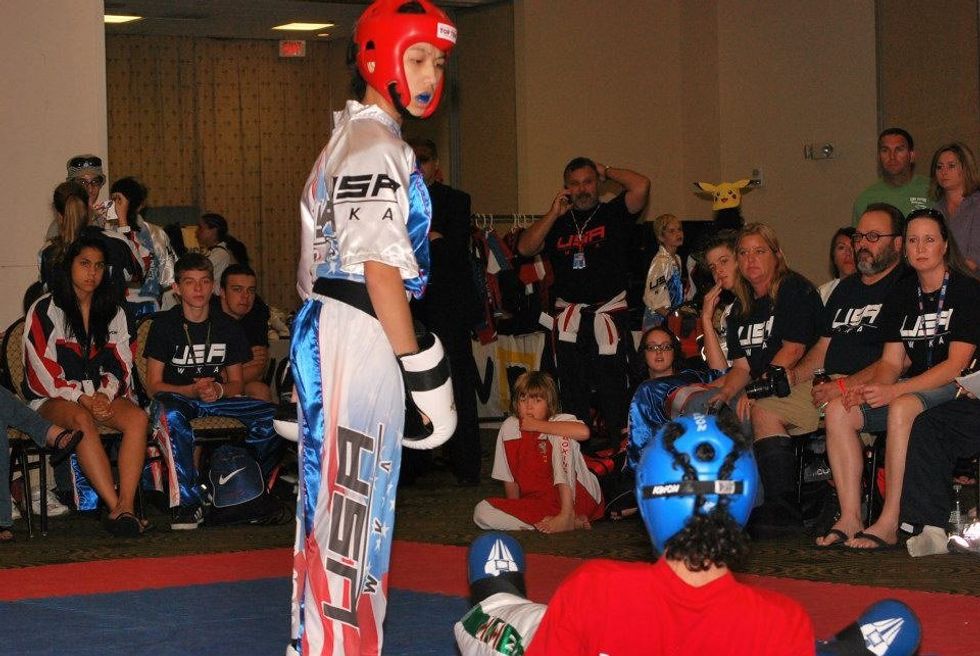This past weekend was the annual U.S. Open World Martial Arts Championships, where martial artists from all around the world gather to compete and battle it out for the top spot. Representatives from all styles, dojos, and countries train relentlessly for months, even years, in advance for a good chance at the top four spots. Moreover, let’s not forget that this tournament not only costs time and effort, but also money. The tournament can be extremely expensive, with bills totaling up to $300 or more just for registration! Think of those who still have to account for travel fees, and compete in multiple divisions.
There is more than one division, you say? You don’t just brawl to the death? How many points do you get for a backflip? Those of you who think that the scene is something straight out of The Karate Kid are sadly mistaken. Although, the final scene filled with school rivalry and dirty shots may unfortunately be relevant in a sport built upon integrity and respect.
Sport martial arts would be a better description for the type of competition that takes place, including various sparring (fighting) and form (routine) divisions ranging from traditional to “extreme. Check out this video if you’re more interested.
Nowadays, the sport is often separated by those who identify as fighters, or as strictly a forms specialist. It is quite rare to find martial artists who are able to dominate both types of divisions, especially once you reach the adult level. Though these two groups of martial artists may find some animosity amongst each other, especially when it comes to testing each other’s talents in “true” martial arts, one thing that everyone can agree upon is the presence of bias (surely, this applies to any other professional level sport).
Within any given industry, the presence of prejudice is undeniable. It can be fueled by monetary capital or pure human emotional attachment (usually hatred or adoration). Of course, there is never an unbias opinion. Judges and regular people tend to unconsciously favor a side even in the slightest, no matter how hard they try to be impartial.
So fair judging is unavoidable? Of course not. The problem lies in individuals who are explicitly and subliminally trained by the system to -- intentionally using their power -- extort the outcome of the competition. In other words, judges need to at least try and be as fair as possible, and if not, they should probably just stay home. I can already picture all the judges reading this article thinking, "Pshh, that's not me." Odds are, it is you.
Like other professional sports, the world of martial arts consists of corporate sponsors who recruit athletes to represent their brand. To earn a coveted spot on one of these teams not only means that your finances will be a little more at ease, but also that judges will actually take you seriously. But what about all the other competitors who are not recruited? What if they are just as good, or dare I say, better than the sponsored athlete? Unfortunately, most of the time they are underrated in the eyes of the judges. This is not to say that it happens every time, but at tournaments like the U.S. Open, where there is bound to be new talent that shows up, it should grant some concern.
It's easy for competitors at the top to ignore their privilege as it plays out in their favor, even when they deserve to lose. We worked hard for this spot. That doesn't mean that it's fair to take wins when you're having an off day. If the star student in your math class decides to show up to class unprepared for the exam and still receives an A without the teacher checking for the right answers, wouldn't you feel outraged?
And, yet, instead of coming together to reinvent the clearly present politics within the sport, we are so quick to turn against each other with team rivalry and blaming of certain individuals, rather than the industry as a whole. The current state of the sport is not a product solely produced by one promoter or one team or one competitor. Whether you are taking part in the verbal bashing or direct manipulation of fair competition, you are contributing to this cyclical phenomenon that allows grown, mature adults to yell against nine year-old kids because they were upset their child lost to said kid (I witnessed this exact example this past weekend).
Overall, the competitive martial arts world needs some serious changes if we want to live up to the integrity we so pride ourselves on. Athletes deserve fair competition, free from privilege and corporate manipulation. The U.S. Open has, unfortunately, become so strongly influenced by size and marketability that it is permeated by unqualified judges and bias.
Let's stop pointing fingers and yelling at children, and instead redirect that anger towards support for equal opportunities in athletics. Stop wasting your breathe and money -- do something about it. Use that loud screaming voice for something productive and not hateful. After all, you can't blame the student for playing the system, but you can blame the teacher for creating that system.
You can watch videos and browse pictures from the U.S. Open at sportsmartialarts.com.





















